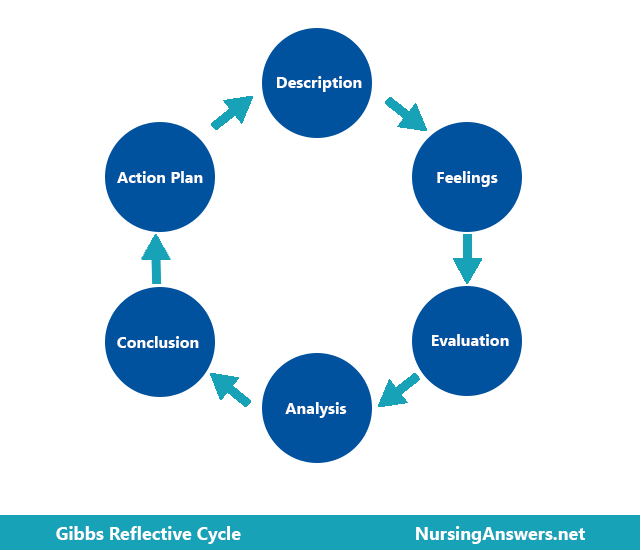Introduction
Gibbs' Reflective Cycle was developed by Graham Gibbs in 1988 to give structure to learning from experiences. It offers a framework for examining experiences, and given its cyclic nature lends itself particularly well to repeated experiences, allowing you to learn and plan from things that either went well or didn’t go well.
Gibbs' reflective cycle, was originally devised for nursing, but - like Rolfe's model of reflection - has become popular across many disciplines, and is widely applied as a prominent model of reflective practice.
More resources can be found on Gibb's Reflective Cycle here.
The Six Stages of Gibbs' Reflective Cycle
This model is cyclic and has six principal elements:

1. Description
In this element of the cycle, you recount what you are reflecting upon, giving a descriptive account with contextual information as appropriate. If reflecting to others (as a piece of academic or report writing, for example) make sure that they have all the relevant information. If using Gibbs to reflect to oneself, they though you might have all of that knowledge to hand, it can be useful to make notes of such details for clarity and for comprehensiveness of the reflection.
2. Feelings
In this section, you look back on your emotional state and your rational thoughts about the situation or occurrence being reflected upon. How were you feeling at the time? Was this normal for you? How did your emotions and thoughts alter (if at all) after the situation arose? Be accurate and insightful in your reflection.
3. Evaluation
In the evaluative element of the cycle, consider how well the situation was handled. Look for positives as well as negatives; be fair to yourself and to the contexts of the event being reflected upon. How did you react? How did others around you respond? Was the event being considered a good or a bad one? Was a resolution arrived at? If not, why not? If a conclusion was made, then how was that done, and was it effective?
4. Analysis
Here, think about the individual aspects of the event which might have been crucial, and whether they are positive or negative towards the event unfolding. It may be appropriate to integrate pedagogic theory with practice here; were actions informed by a particular paradigm or insight when perhaps there were alternatives which might have been more appropriate, for example?
5. Conclusion
As you conclude your investigation of what has occurred, it may be relevant for you to consider possible alternatives to the course of action that you took, whether other options could have been applied instead, and what might have happened differently if those alternatives had been executed. If the way you acted ended in a positive outcome, then recognise this, so that you can begin to draw plans to consider taking the same direction if the same situation arises in the future. If the situation was negative in some way, this is the part of the cycle where you consider how to ensure that there is no recurrence.
6. Action Plan
The action plan is your guide for future action. This section is crucial, as it is here that you identify what you will do (and thus, what you will not do) to ensure an improvement in your handling of similar situations in the future. Action plans are useful spurs for discussions with peers and other colleagues; do they agree with your proposals for action, and do they have any insight or experience which might inform your action planning?
Moving through the six stages of the cycle effectively should mean that you will be better equipped for the future is events like the ones being reflected upon here occur again. Your action plan should feed into your approach, and so may form a part of the descriptive element of the next round of reflection.
Evaluation
Advantages of Gibbs' cycle include the focus which is placed on a systematic consideration of separate phases of a learning experience. Though it is more developed than the core three questions of Rolfe's model, Gibbs' headline elements are nevertheless straightforward and accessible, and so they can encourage clear reflection which can be made meaningful to others.
The potential disadvantages of Gibbs' model are that it tends to the descriptive, and may not provide the analytical rigour required to fully appreciate the implications of certain courses of actions of others, or of the thought processes underpinning those actions being taken. The model is one-sided, so it takes into consideration the practitioner's perspective only; there is no room in Gibbs' cycle to take into consideration those on the other side of the event or situation being addressed, and there may be useful insight here to be considered (Jasper, 2013).
Cite This Work
To export a reference to this article please select a referencing style below:

